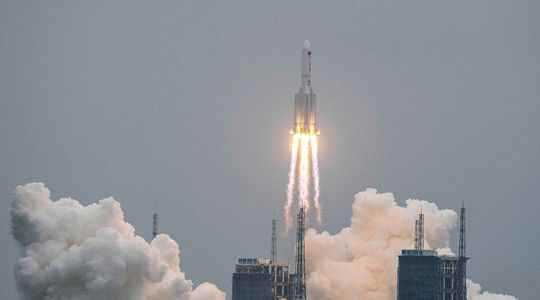It’s a fear coming from the Gauls that never fails to make us smile. This time, it’s not the sky that might fall on our heads, but a piece of rocket. According to the Aerospace Corporation, an American company specializing in aerospace, a large space debris should make an “uncontrolled entry” into the atmosphere this Sunday, July 31, and therefore crash on Earth. This debris, a cylinder 33 meters long and weighing more than 20 tonnes, constituted the stage of the Chinese Long March 5B rocket, which left for space on July 24 to launch a secondary module around the space station of China. If the module has been attached correctly, a piece of rocket now floats freely in space.
It must be said that the Long March 5B rocket has a particularity compared to its cousins: it has only one stage, when the others have two. In the vast majority of cases, the first stage of a rocket provides the first push, before detaching to a safe place. A second floor, much smaller, then takes over. But on the Long March 5B rocket, the first stage does all the work. “Normally, the first stage of a rocket and the boosters that accompany it are not designed to reach an orbit,” explains the Aerospace Corporation. Indeed, letting a large piece of debris float beyond human control can be dangerous, because we know that, sooner or later, it will end up falling.
Shipments that annoy NASA
This is not the first time China has used a Long March 5B rocket, but the third. On April 29, 2021, the first module of the Chinese space station was launched into space by this means. The first stage then entered orbit, before crashing into the Indian Ocean on May 8. A year earlier, debris certainly from a rocket of this type had damaged buildings in Côte d’Ivoire, without causing any casualties. These uncontrolled returns had annoyed NASA and its administrator, who declared, after the second uncontrolled return to Earth, that China did not meet “the standards of responsibility for its space debris”. Beijing does indeed seem to care, believing that the likelihood of debris causing human damage remains very low, due to the extensive ocean coverage of our planet. The country is also considering a new shipment from 2023.
Fortunately, the entire stage will not fall back to Earth, large parts being consumed upon entry into the atmosphere. Nevertheless, expect to see 5 to 9 tons of material crossing the land border. As for knowing where the impact will take place, the Aerospace Corporation relies on the United States space surveillance network to locate, as precisely as possible, the landing zone between the 41st parallel north, south of the Europe, and the 41st parallel south, south of Africa. A huge area, therefore, including most of America, all of Africa and southern Asia, but also a large part of the Earth’s oceans. France will not be affected.
